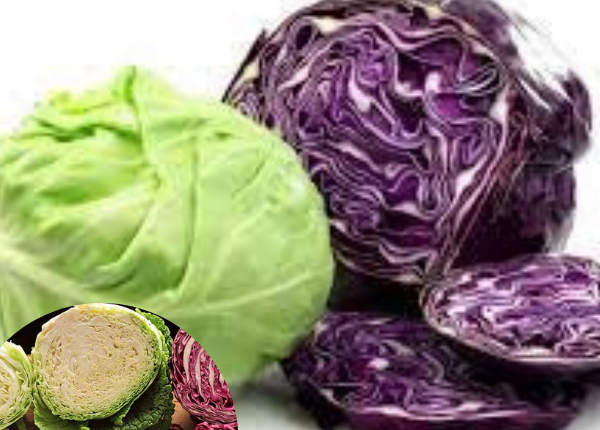Is cabbage better for you cooked or raw – Cabbage is a cruciferous vegetable that comes in a variety of forms such as green, purple, and savoy cabbage.
Cabbage is a versatile vegetable that can be eaten raw or cooked. Both cooked and raw cabbage can be healthy for you, but they have slightly different nutritional profiles and benefits.
Raw cabbage is an excellent source of vitamin C, which is a powerful antioxidant that helps protect your body from damage caused by free radicals. It’s also high in fiber, which can help promote digestive health, and contains small amounts of vitamin K, vitamin B6, and potassium.
Cooking cabbage can also have some benefits. For example, cooking can help break down some of the fiber in cabbage, which can make it easier for your body to digest. Additionally, cooked cabbage is a good source of vitamin K, which is important for bone health and blood clotting.
However, it’s important to note that cooking cabbage for too long or at too high a temperature can cause some of the nutrients to break down, so it’s important to be mindful of how you prepare it.
Overall, whether you prefer to eat your cabbage raw or cooked, it can be a healthy addition to your diet. Just be sure to include it as part of a balanced, nutrient-rich meal plan.
Is cabbage better for you cooked or raw – Benefits
1. Nutritional benefits of cabbage:
Cabbage is a low calorie and high fiber vegetable that is packed with essential vitamins and minerals. One cup of chopped cabbage contains only 22 calories and 2 grams of fiber. Cabbage is also a good source of vitamins C and K, calcium, and potassium.
2. Cabbage and digestion
Cabbage’s high fiber content makes it an excellent food for digestion. Fiber is essential for maintaining a healthy digestive system, and cabbage’s high fiber content helps to keep things moving smoothly. Cabbage also has anti-inflammatory properties that can help to reduce inflammation in the gut.
3. Cabbage and cancer prevention:
Cabbage contains phytochemicals that have been shown to have anticancer effects. These phytochemicals, such as sulforaphane and indole-3-carbinol, have been found to help reduce the risk of certain types of cancer, such as lung, colon, and breast cancer.
4. Cabbage and heart health:
Cabbage has been found to have a positive effect on heart health. Cabbage contains compounds that can help to lower blood pressure and cholesterol levels, both of which
5. Cabbage and weight loss:
Cabbage is an excellent food for weight loss due to its low calorie and high fiber content. High fiber foods keep you feeling fuller for longer, which can help to reduce calorie intake and aid in weight loss. Additionally, cabbage contains compounds that help to regulate metabolism, further contributing to weight loss.
6. Cabbage and skin health:
Vitamin C is essential for collagen production, which is crucial for healthy skin. Cabbage is an excellent source of vitamin C, making it a great addition to your diet for healthy and glowing skin.
7. Cabbage and immune system function:
Cabbage’s high vitamin C content is beneficial for the immune system. Vitamin C helps to support the immune system by stimulating the production of white blood cells, which fight off infection and disease.
8. Cabbage and brain health:
Vitamin K, found in cabbage, is essential for cognitive function. Vitamin K plays a crucial role in the production of myelin, which is necessary for communication between neurons in the brain.
9. Cabbage and bone health:
Cabbage is an excellent food for bone health due to its high calcium and vitamin K content. Calcium is essential for bone health, while vitamin K plays a crucial role in bone metabolism.
10. Cabbage and eye health:
Vitamin A, found in cabbage, is essential for eye health. Vitamin A helps to maintain the health of the cornea and is necessary for good vision.
11. Cabbage and blood sugar regulation:
Cabbage has a low glycemic index, which means it is an excellent food for blood sugar regulation. High glycemic foods can cause spikes in blood sugar levels, which can be detrimental to health. Cabbage’s low glycemic index makes it an excellent food for those with diabetes or those looking to maintain healthy blood sugar levels.
12. Cabbage and detoxification:
Cabbage contains sulfur, which is essential for liver detoxification. The liver is responsible for filtering out toxins from the body, and sulfur aids in this process.
13. Cabbage and inflammation:
Cabbage’s anti-inflammatory properties make it an excellent food for reducing inflammation in the body. Chronic inflammation can lead to a host of health issues, so incorporating anti-inflammatory foods like cabbage into your diet can help to reduce the risk of disease.
14. Cabbage and hair health:
Vitamin C and sulfur, found in cabbage, are beneficial for hair health and growth. Vitamin C is essential for collagen production, which is necessary for hair growth, while sulfur aids in the production of keratin, which is essential for strong and healthy hair.
15. Cabbage and pregnancy:
Folate is essential for fetal development during pregnancy, and cabbage is an excellent source of folate. Incorporating cabbage into your diet during pregnancy can help to ensure healthy fetal development.
16. Cabbage and thyroid function:
Iodine is necessary for healthy thyroid function, and cabbage is an excellent source of iodine. Ensuring adequate iodine intake is crucial for maintaining healthy thyroid function and preventing thyroid disorders.
17. Cabbage and energy levels:
Cabbage’s high iron content is beneficial for maintaining healthy energy levels. Iron is necessary for the production of hemoglobin, which carries oxygen to the cells in the body, and can contribute to feelings of fatigue and lethargy if deficient.
18. Cabbage and environmental sustainability:
Cabbage is a sustainable crop, meaning it is a great choice for those looking to reduce their environmental impact. Cabbage requires minimal water and fertilizer compared to other crops, making it a more environmentally friendly choice.
Conclusion
In conclusion, cabbage is a highly nutritious and versatile vegetable that has numerous health benefits. From aiding digestion to cancer prevention to sustainable farming practices, incorporating cabbage into your diet is way to go! Source
Learn The | Side Effects Of Eating Beetroot – Disadvantages Or Cons To Know






